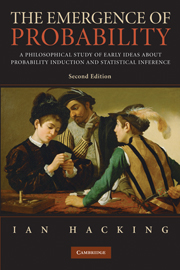 The Emergence of Probability
The Emergence of Probability Book contents
- Frontmatter
- Contents
- Introduction 2006
- 1 An absent family of ideas
- 2 Duality
- 3 Opinion
- 4 Evidence
- 5 Signs
- 6 The first calculations
- 7 The Roannez circle (1654)
- 8 The great decision (1658?)
- 9 The art of thinking (1662)
- 10 Probability and the law (1665)
- 11 Expectation (1657)
- 12 Political arithmetic (1662)
- 13 Annuities (1671)
- 14 Equipossibility (1678)
- 15 Inductive logic
- 16 The art of conjecturing (1692[?] published 1713)
- 17 The first limit theorem
- 18 Design
- 19 Induction (1737)
- Bibliography
- Index
- Frontmatter
- Contents
- Introduction 2006
- 1 An absent family of ideas
- 2 Duality
- 3 Opinion
- 4 Evidence
- 5 Signs
- 6 The first calculations
- 7 The Roannez circle (1654)
- 8 The great decision (1658?)
- 9 The art of thinking (1662)
- 10 Probability and the law (1665)
- 11 Expectation (1657)
- 12 Political arithmetic (1662)
- 13 Annuities (1671)
- 14 Equipossibility (1678)
- 15 Inductive logic
- 16 The art of conjecturing (1692[?] published 1713)
- 17 The first limit theorem
- 18 Design
- 19 Induction (1737)
- Bibliography
- Index
Summary
The equipossibility account of probability enabled continental workers to operate simultaneously with epistemic and aleatory concepts of probability. But for Leibniz, who invented the idea, it meant far more. It enabled him to conceive of probability theory as an integral part of his metaphysics and epistemology. One by-product of this is that Leibniz anticipated the philosophical programme of J. M. Keynes, Harold Jeffreys and Rudolf Carnap, which has come to be known as inductive logic. We cannot study this in isolation from the rest of Leibniz's philosophy. C. D. Broad has called Leibniz ‘the greatest pure intellect whom we have known’. One aspect of his intellect is its attempt to combine every aspect of human knowledge, action, and speculation into an elaborately structured but totally co-ordinated unity. We can start on the outside, with inductive logic, but we shall inevitably be drawn into more central concerns.
Leibniz thought that the science of probability would become a ‘new kind of logic’ (P.S. v, p. 448), but this idea lay dormant until around 1920 when it was revived by Jeffreys and Keynes. Later, in the 1940s, Carnap set to work with a particular approach which has, in recent years, been taken as the sole format for inductive logic. The tenets of this programme can be set out tersely as follows: First, there is such a thing as non-deductive evidence. That is, there may be good reasons for believing p which do not logically entail p. Second, ‘being a good reason for’ is a relation between propositions. Third, this relation is to be characterized by a relation between sentences in a suitably formalized language.
- Type
- Chapter
- Information
- The Emergence of ProbabilityA Philosophical Study of Early Ideas about Probability, Induction and Statistical Inference, pp. 134 - 142Publisher: Cambridge University PressPrint publication year: 2006
